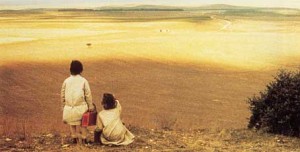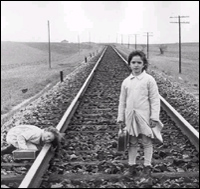 After the violent Spanish Civil War, Generalísimo Franco overthrew the left-wing Popular Front administration that was selected by a general election; this movie is set just after Franco seized power in 1939. Following this, a reign of terror continued in Spain until Franco died in 1975, and people remained silent during these times out of fear of retribution. In 1973 when this movie was made, the dictatorship was not as severe as it was initially, but movies were still strictly censored by authorities. The reason why even recent Spanish movies have many metaphors and abstractions may be that this way of expression became a part of the engrained culture of the intelligentsia, who faced 40 years of cultural oppression. In fact, there is not a single dramatic event in this movie. This is the kind of movie that makes me wonder after finishing the movie what it wanted to say.
After the violent Spanish Civil War, Generalísimo Franco overthrew the left-wing Popular Front administration that was selected by a general election; this movie is set just after Franco seized power in 1939. Following this, a reign of terror continued in Spain until Franco died in 1975, and people remained silent during these times out of fear of retribution. In 1973 when this movie was made, the dictatorship was not as severe as it was initially, but movies were still strictly censored by authorities. The reason why even recent Spanish movies have many metaphors and abstractions may be that this way of expression became a part of the engrained culture of the intelligentsia, who faced 40 years of cultural oppression. In fact, there is not a single dramatic event in this movie. This is the kind of movie that makes me wonder after finishing the movie what it wanted to say.
There is only one scene in the movie that implies that a Republican soldier who escapes is shot dead, and the censors also made note of this scene; however, they figured, “Nobody will watch such a boring movie,” and the whole movie made it through the screening process uncut. During this time, moviemakers made their political agenda increasingly abstract, while authorities tried harder and harder to find the hidden political agenda, like a monkey chasing a weasel. However, when this work was finally screened, it touched people, and it established a reputation as a masterpiece. Was it because people were touched by the beautiful images in this movie, or because the Spanish audience learned the art of discovering something in the metaphors?
 Since this movie is so abstract, viewers are allowed to interpret it in many possible ways. To give an example of an extreme interpretation as a political metaphor, the father who spends all his time on a trivial beehive study symbolizes the intelligentsia, who gave up their true interests in order to survive. The beehive society that he hates is a metaphor for the society under the control of Franco, which is orderly, but devoid of creativity. The mother spends her days writing letters to a former lover (I assume, based on how the movie depicts it) who is a Republican fugitive; this symbolizes the longing for freedom and the nostalgia for the past. The two daughters are in the same generation, but the older sister Isabel—who seems quite mature for her age—represents the young generation who adapted to Franco’s administration without criticism, while the younger sister Ana—who looks at the world with frightened eyes—symbolizes the idealistic youth in Spain in the 1940s. The emotionally discordant situation of the protagonist Ana’s family symbolizes the division in Spain due to the Spanish Civil War, while the ruins and the surrounding desolate scenery represent the sense of isolation felt when the Franco administration was first established. Near the end, the mother—who ignored her children and stayed in her own world—softens emotionally, and the bonds between the family members becomes stronger; this can be interpreted as hope for Spain’s future.
Since this movie is so abstract, viewers are allowed to interpret it in many possible ways. To give an example of an extreme interpretation as a political metaphor, the father who spends all his time on a trivial beehive study symbolizes the intelligentsia, who gave up their true interests in order to survive. The beehive society that he hates is a metaphor for the society under the control of Franco, which is orderly, but devoid of creativity. The mother spends her days writing letters to a former lover (I assume, based on how the movie depicts it) who is a Republican fugitive; this symbolizes the longing for freedom and the nostalgia for the past. The two daughters are in the same generation, but the older sister Isabel—who seems quite mature for her age—represents the young generation who adapted to Franco’s administration without criticism, while the younger sister Ana—who looks at the world with frightened eyes—symbolizes the idealistic youth in Spain in the 1940s. The emotionally discordant situation of the protagonist Ana’s family symbolizes the division in Spain due to the Spanish Civil War, while the ruins and the surrounding desolate scenery represent the sense of isolation felt when the Franco administration was first established. Near the end, the mother—who ignored her children and stayed in her own world—softens emotionally, and the bonds between the family members becomes stronger; this can be interpreted as hope for Spain’s future.
Another extreme interpretation is that this story has nothing to do with politics, and that it is just about the little girl Ana growing out of her child mentality that merges the real and imaginary worlds.
Therefore, everybody can appreciate the beauty of the images, but the opinions on how to interpret the movie seems to be divided. Since everyone in Spain in those days had to live life as if they were being watched by someone behind them, it is unlikely that this director had no political stance at all. This is because everybody had to internally deal with the reign of terror. However, I don’t think that the whole movie symbolizes an anti-government protest. I don’t believe this movie was so calculated in its construction.
This movie depicts the sense of fear any young child feels in an unknown world. Frankenstein’s monster, the dark, nighttime, ruins, poisonous mushrooms, ghosts, deep wells, the forest, reflections in a pond, and railways are all fears of children. However, while it is natural for a child like Ana to have these fears, she strangely lacks the parents who should hold her and say, “Don’t be afraid, it’s okay.” The reason is that the parents also have a fear—the government. During Ana’s search for Frankenstein’s monster, she meets a soldier who escaped. Since the escaped soldier is shot to death, Ana realizes—although just vaguely—that there is something in the real world that is even scarier than any fear that she came up with in her mind. Perhaps this is the criticism of the government that is hidden in this movie.
